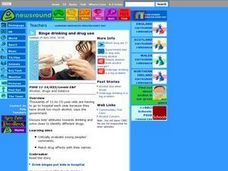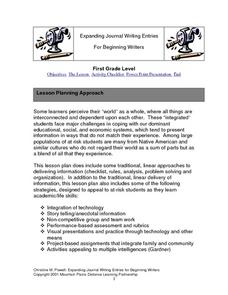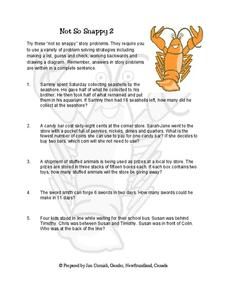Curated OER
Good Health
Students complete a unit with cross-curricular activities to learn about a healthy body and maintaining their health. In this health instructional activity, students complete 8 lessons to learn about good health, a healthy diet, healthy...
Curated OER
Number Cents
Students identify the value of coins. In this number cents lesson, students use coins to create sets of equivalent values. They create patterns with coins and write the value of coins in two forms. Students count the value of given coins.
Curated OER
Estimation
Students estimate the cost of individual items found on a typical grocery list. They participte in a teacher-led demonstration, solve word problems, and estimate the cost of ten items placed into their group's grocery basket.
Curated OER
The Take-Awar Bar 1
Students use an Internet tool, "The Take-Away Bar" to solve subtraction problems by breaking them into parts. They write and solve comparison problems. Students make sensible estimates and check the reasonableness of answers. They use...
Curated OER
What Begins With Bb?
Students demonstrate beginning reading strategies. In this letter recognition lesson plan, students match letter sounds to a variety of pictures using the program "Kidspiration".
Curated OER
Place Value
Second graders complete math problems. In this place value lesson, 2nd graders read the book "One Grain of Rice" and use it to learn about place value. Students use index cards and rice to complete a place value activity.
Curated OER
Fact Families
Students create "fact families" using digital pictures of their classmates and knowledge of basic math concepts (subtraction and addition) in this technology-based math instructional activity intended for use in the early-elementary...
Curated OER
Imagery: Symbolic/realistic
Students recognize and use the visual arts as a form of communication. They use the computer as a visual arts tool to gather images for a story they are telling. They discuss related stories that differ in their realistic images. They...
Curated OER
Jack and the Beanstalk
Third graders read a story and grow a beanstalk. In this literature and life science lesson, the class reads "Jack and the Beanstalk," then lists fairy tale elements and write a puppet show. The students plant pinto beans and observes...
Curated OER
Eatem Up!
Students identify, interpret and demonstrate a positive learning attitude. They identify, comprehend and use basic concepts and skills and then, communicate clearly in oral, artistic, written, and nonverbal form. Students also identify...
Curated OER
Binge Drinking and Drug Use
Students critically evaluate young peoples' comments on under age drinking. They map out valleys tieing together communities and drinking problems in a variety of situation. In addition, they correlate drinking and education in schools...
Curated OER
Expanding Journal Writing Entries For Beginning Writers
First graders through a variety of strategies assess how to write in journals openly and effectively. Those strategies include integration of technology, story telling, group and team work, performance-based assessment/rubrics, visual...
Curated OER
Labor, Choice, and Sales Tax
Learners consider the idea of earning and spending money. For this money management lesson plan, students discuss the concept of saving and spending money through the reading of a story and by completing several activities that involve...
Curated OER
Hopes and Dreams: A Spreadsheet Lesson Using Excel
Fourth graders read "The Far Away Drawer" by Harriet Diller and discuss the story as a class. After discussion, 4th graders create a t-shirt GLYPH about their hopes and dreams,share their information with the class and create spreadsheets.
Curated OER
The Human Organism
Students identify their feelings and learn constructive ways of handling conflict. In this human mental health lesson plan, students identify their feelings, learn how to tell others about their feelings, and learn how to resolve...
Mathematics Vision Project
Module 5: Features of Functions
The language and features of functions get careful treatment in a complex but doable lesson. Learners get a lot of practice really figuring out what a graph means in context, and also identifying key features of graphs. Key ideas like...
Curated OER
Multiplication: Building Models, Representations and Explanations
First graders explore multiplication concepts through skip counting, repeated addition and arrays. Using animal characteristics as a context, 1st graders solve problems using mathematical tools such as hundreds charts, number lines, ...
Curated OER
Multiplication Illustration
Third graders use literature and art to apply the principals of multiplication with three or more factors. They write and illustrate their own books following criteria outlined in a checklist imbedded in this plan.
Curated OER
Adding and Subtracting Fractions
Second graders use blocks to show the addition and subtraction of fractions with common denominators. They identify the steps in these functions and complete a worksheet.
Curated OER
Not So Snappy 2
In this order of operations (i.e., addition, subtraction, multiplication, division) instructional activity, students solve 5 word problems demonstrating their understanding of the concept.
Curated OER
Visual and Number Patterns
Fourth graders develop strategies for identifying geometric and number patterns. In this mathematical patterns lesson, 4th graders use pattern blocks to make repeating patterns with numbers and shapes. Students then explore number...
Curated OER
Not So Snappy 4
In this order of operations (i.e., addition, subtraction, multiplication, division) worksheet, students solve 4 word problems demonstrating their understanding of the concept.
Curated OER
Loving Literature
First graders, after having "Are You My Mother?" by P.D. Eastman read to them, participate in group discussions or independentally work to analyze a spreadsheet to identify essential elements in the story and graph their data. In...
Curated OER
"The Grapes of Math" by Gregg Tang
Students practice mental addition and use the associative and commutative properties of addition to solve problems.

























